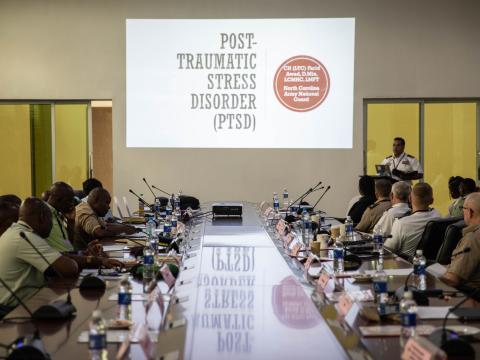Corruption Could Cloud Afghanistan's Future
The situation in Afghanistan is good but not great, and corruption is the biggest problem facing the nation, according to Maj. Gen. John A. Toolan Jr., USMC. Gen. Toolan commanded the II Marine Expeditionary Force (Forward) and Regional Command (Southwest) concurrently between 2011 and 2012.
The corruption comes in two forms: the parasitic type found in the central government and the predatory corruption found in the military and police forces, especially the Afghan National Police. At the high level, dishonest officials use the current weak state of the Afghan government as a host off which they feed, often also making money from the drug trade. Unless the government continues to strengthen, such parasitic corruption will progress, Gen. Toolan says.
Predatory corruption involves exploiting vulnerable members of the general population. In these cases, military or police officials engage in practices such as extorting money from local Afghans or seizing land.
Despite these problems, Gen. Toolan believes that the Taliban no longer has the general populace on its side; citizens now consider the legitimate government "the home team." However, if predatory corruption continues and is allowed to exist, the government will lose the support of the people. “Then the game’s over,” Gen. Toolan states.
The Afghan military and police already have better leadership, training and equipment than the Taliban, but improvements are necessary to ensure their continued success. On the military side, Gen. Toolan says forces must develop a noncommissioned officer corps. Afghan police need better counter-improvised device tools, because they deal with the threat of the weapons in the population centers they patrol.
Law enforcement officers are a primary concern for groups seeking to root out corruption because they have the closest interactions with the general public. Compounding the problem is the blurred lined between combat operations and law enforcement activity in the country. Gen. Toolan explains that until the role shifts to criminal investigations and evidence collection, officers will not earn the title of community police. He would like to see military personnel stop dabbling in police work and instead bring in law enforcement experts as advisers and trainers.
The model he prefers is based on his experience as a J-5 in Bosnia. In that situation, police forces from multiple NATO nations trained local forces and helped maintain order. The general estimates that upward of 5,000 law enforcement officers poured into Bosnia to undertake the task. He believes that Afghanistan is now safe enough to invite these personnel to enter the country. Some law enforcement professionals are there currently but not enough to operate in every precinct and province.
Gen. Toolan highlights efforts made by the Danish government to establish a police training center that he says is well-designed, but he emphasizes that success depends not only on education within an established venue. Rather, experts must work alongside the Afghans out in their daily situations to really make a difference.
Assistance for the military also must continue. The general believes U.S. efforts in Afghanistan will extend beyond 2014 in terms of support and training for the Afghan National Army. Areas that demand attention include intelligence, surveillance and reconnaissance as well as medical capabilities. According to Gen. Toolan, Afghan forces now sustain more casualties than coalition forces, but coalition medical professionals provide care to them. Not being able to provide proficient medical services is one of the biggest fears of the Afghan authorities, he adds.



